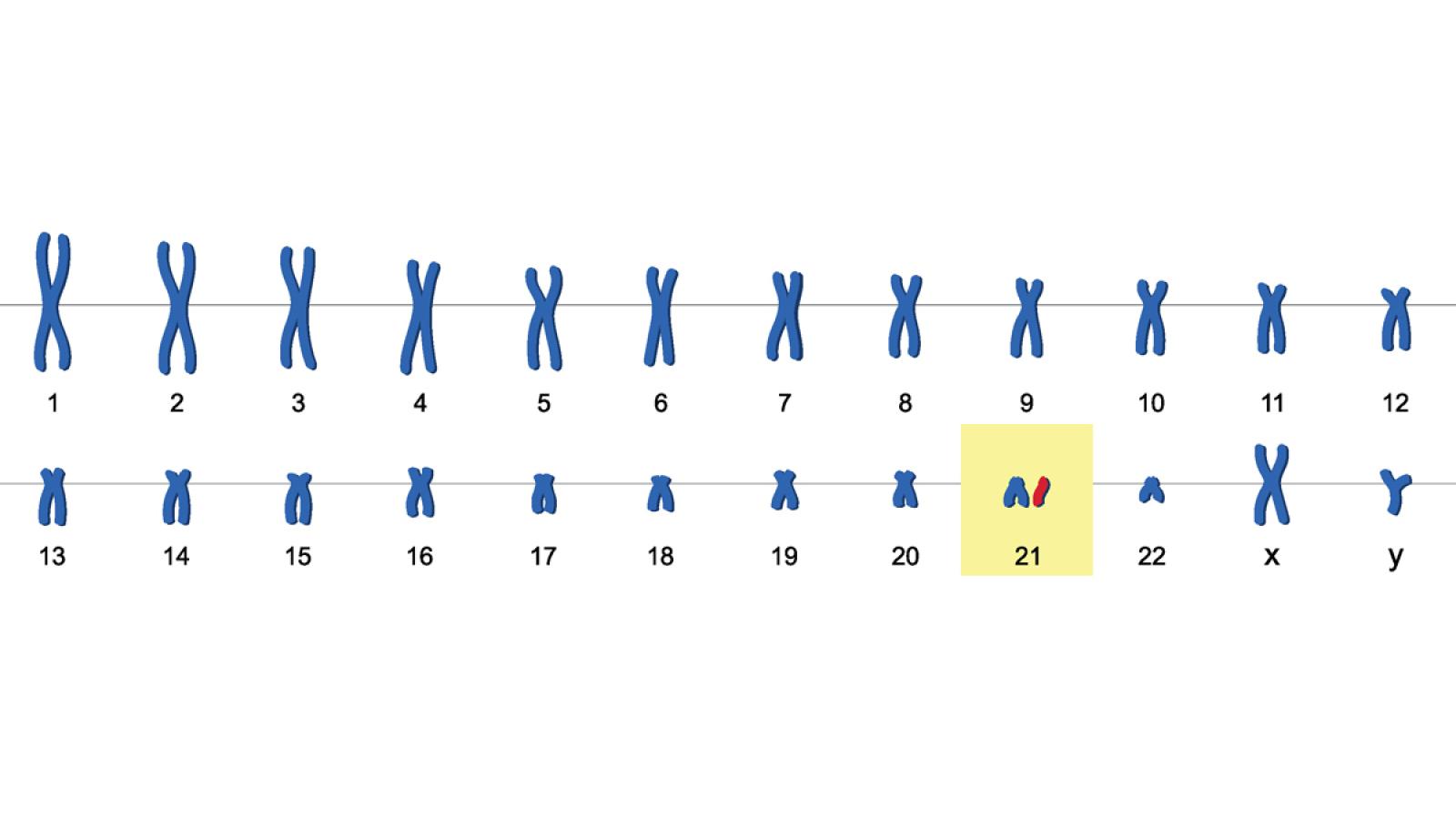A new study led by Dr Frances Wiseman (UK DRI at UCL) has identified a subset of genes that may protect against the accumulation of amyloid beta, a protein implicated in Alzheimer’s disease, in people who have Down syndrome. The study is published in The Journal of Neuroscience.
Down syndrome is a condition characterised by developmental delay and mild to moderate intellectual disability. In addition, around half of all people who have Down syndrome will have a dementia diagnosis by the age of 50 caused by early-onset Alzheimer’s disease.
Down syndrome is caused by an additional copy of chromosome 21. The gene for the amyloid precursor protein (APP) is found on this chromosome, and linked to the high risk of dementia associated with the condition. In the brain, APP is cleaved into several fragments including amyloid beta which accumulates into plaques in Alzheimer’s disease. The third copy of the gene in Down syndrome causes greater levels of amyloid beta to be produced and therefore a higher chance that an individual develops early-onset Alzheimer’s disease.
of all people who have Down syndrome will have a dementia diagnosis by age 50
Individuals who have Down syndrome have a greatly increased risk of developing dementia. Understanding the changes in the brain that cause this increased risk is important in helping to identify the therapies that could be used to slow down or prevent Alzheimer’s disease in this important group.Dr Frances WisemanUK DRI Programme Leader for Animal Models and Group Leader at the UK DRI at UCL
Previous studies pioneered by Dr Wiseman have revealed that an extra copy of other genes located on chromosome 21 may also have an effect on the levels of APP protein in the brain and consequently, the amount of amyloid beta that accumulates. Whether the extra genes have a harmful or protective effect is not yet well understood.
In this new study, the researchers aimed to ascertain the effect of the triplication of other genes present on chromosome 21. They showed that mice with three copies of chromosome 21 had a reduction in the amount of amyloid plaque deposits in their brain compared with mice who only had an extra copy of the APP gene without other chromosome 21 genes.
Through systematic examination of the genes, the team identified a small subregion of chromosome 21, containing 38 genes that could partially protect the brain from the accumulation of amyloid beta plaques.
They established that these genes did not have an effect on the amount of APP present in the brain. Instead, the reduced accumulation of amyloid beta protein may result from a mechanism that either prevents plaques from forming in the first place, or enhances the brains ability to clear them away.
Dr Frances Wiseman, UK DRI Programme Leader for Animal Models and Group Leader at the UK DRI at UCL, said:
“Individuals who have Down syndrome have a greatly increased risk of developing dementia. Understanding the changes in the brain that cause this increased risk is important in helping to identify the therapies that could be used to slow down or prevent Alzheimer’s disease in this important group of individuals. Next, we plan to identify the gene or genes responsible for the protective effect.”
To find out more about Dr Frances Wiseman, visit her UK DRI profile. To stay up to date on the latest research news and Institute updates, sign up to receive our monthly newsletter, ‘Inside Eye on UK DRI'.
Reference: Mumford P, Tosh J, Anderle S, Wikberg EG, Lau G, Noy S, Cleverley K, Saito T, Saido TC, Yu E, Brinkmalm G, Portelius E, Blennow K, Zetterberg H, Tybulewicz V, Fisher EMC, Wiseman FK. Genetic mapping of APP and amyloid-β biology modulation by trisomy 21. J Neurosci. 2022 Jul 14:JN-RM-0521-22. doi: 10.1523/JNEUROSCI.0521-22.2022.
Article published: 18 July 2022
Banner image: Shutterstock/Ody_Stocker
